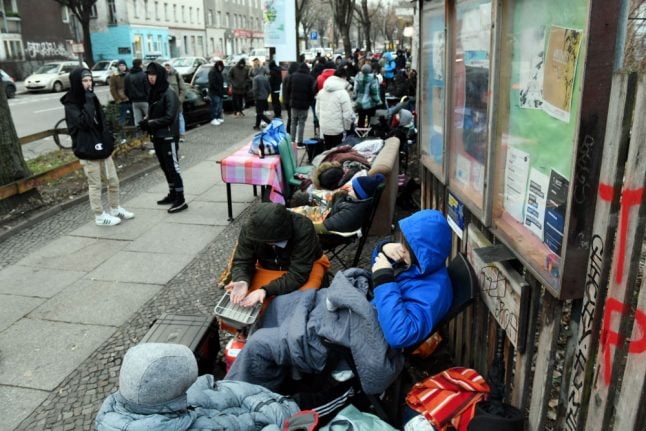With only 500 pairs of the limited edition Adidas sneaker on offer, snow and chilly weather didn’t stop fans from queuing in front of the stores in the Mitte and Kreuzberg districts early in the morning on Tuesday.
At around 1:00am about 550 people were counted – some of whom had been queuing since Saturday – and jotted down on the waiting list. At 6am another count was carried out and those who had left were removed from the list.
 A shot of the exclusive pair of shoes from the shop window. Photo: DPA
A shot of the exclusive pair of shoes from the shop window. Photo: DPA
Peggy from Berlin’s Hellersdorf district said she had been there since Monday morning. Together with Oliver from Friedrichshain, she secured a place in a bus shelter – wrapped in thick blankets and with deck chairs. Other people had put up tents and camping tables on the sidewalk.
“I came from Leipzig on Saturday and am 73rd in the queue,” said Andreas Leu, who was wrapped up in a big red sleeping bag.
“What's most interesting is the ticket and there are only 500 pairs. I'm keeping it for my collection,” he added.
Julian Kienst, who was standing next to Leu, said: “It helps me save quite a lot of money that I can use for other things, particularly since I don't make that much.”
“The shoes are cool, but I want the BVG ticket first and foremost,” 18-year-old Sara told Tagesspiegel.
Celebrating the sneakers' popularity in its typical ironic fashion on Twitter, the BVG tweeted: “Letting people wait – it's one of our superpowers.”
The sneaker bearing the design of seat covers on Berlin's U-Bahn trains that has an annual ticket sewn into its flap was priced at only €180. An annual BVG ticket costs upwards of €761. On Ebay, it was offered for €600 before the official start of sales on Tuesday.
The conservative newspaper noted that few pairs of the shoes would likely end up on commuters' feet as they will be more valuable if kept in mint condition as collectors' items.
Barely minutes after the sneakers went on sale at 10 am (0900 GMT), some were being offered online at up to €1,150 – around six times their original price.
The sneakers are valid until the end of 2018 as a ticket on Berlin U-bahn (subways), trams, buses and ferries – but only if they are worn at the time of travel.



 Please whitelist us to continue reading.
Please whitelist us to continue reading.